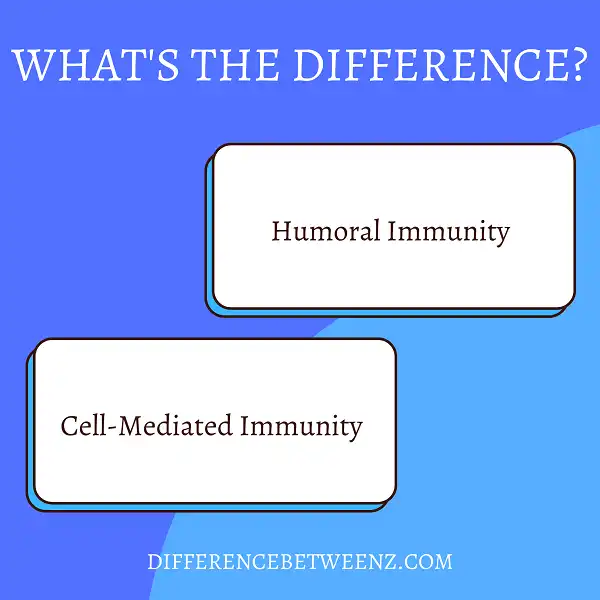The difference between humoral and cell-mediated immunity is an important distinction to understand. Humoral immunity refers to the body’s ability to produce antibodies that target viruses, bacteria, or other foreign substances. Cell-mediated immunity refers to the body’s ability to use T cells to identify and destroy infected cells. Both forms of immunity are important for protecting the body against infection, but they work in different ways. Understanding the difference between humoral and cell-mediated immunity can help you better protect your health.
What is Humoral Immunity?
Humoral immunity is the branch of immunity that is concerned with circulating antibodies and other humoral factors. Humoral immunity is mediated by B cells, which produce antibodies against specific antigens. Antibodies can neutralize viruses and bacteria, making them unable to infect cells.
In addition, antibodies can also bind to toxins and render them harmless. Humoral immunity is important for protecting against infections, but it can take several days for B cells to produce enough antibodies to provide effective protection. Therefore, humoral immunity is most effective when it is used in conjunction with cell-mediated immunity.
What is Cell-Mediated Immunity?
Cell-mediated immunity is an important process in the body’s ability to fight off infection. This type of immunity is mediated by cells, rather than antibodies, and is typically more effective against viruses and other intracellular pathogens.
Cell-mediated immunity can be further divided into two types: T cell-mediated immunity and B cell-mediated immunity. T cells are important for killing infected cells and for providing help to other immune cells. B cells produce antibodies, which can neutralize pathogens and mark them for destruction. Each type of cell-mediated immunity plays a critical role in protecting the body from disease.
Difference between Humoral and Cell-Mediated Immunity
Humoral immunity is the branch of the immune system that is concerned with protecting the body against infection by bacteria and other microorganisms. It does this by producing antibodies, which circulate in the blood and bind to the microorganisms, neutralizing them. Cell-mediated immunity, on the other hand, is the branch of the immune system that is concerned with protecting the body against infection by viruses and other intracellular pathogens.
It does this by producing cytotoxic T cells, which kill infected cells. Both humoral and cell-mediated immunity are important for protecting the body against infection, but they work in different ways. Humoral immunity is more effective against extracellular pathogens, while cell-mediated immunity is more effective against intracellular pathogens.
Conclusion
The immune response can be broadly divided into two categories- humoral immunity and cell-mediated immunity. Humoral immunity is the result of antibodies that are produced in response to an infection and circulate in the bloodstream. Cell-mediated immunity, on the other hand, is a more specific response that involves white blood cells attacking infected cells. Each type of immune response has its own advantages and disadvantages.


